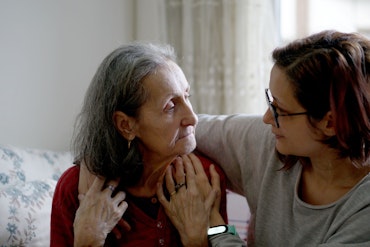Housing crash leaves elderly struggling to pay care bills in UK
The fall-out from the UK credit crunch has another casualty: elderly people who are struggling to release funds from their houses to pay care-home (nursing homes in Australia) fees, according to a report in the UK Observer.
Sam Dunn wrote on 7 December 2008, that the elderly and their families are tapping into equity to pay annual fees of at least £24,500 – but now face a shortfall in bills, with sliding residential house prices continuing to knock tens of thousands of pounds off the value of homes.
“With most people’s wealth tied up in property, the credit crunch is the biggest problem for those who are struggling to sell their house to pay their care home fees,” says Alex Edmans, care-home funds adviser at Saga advice and financial services group for the over-fifties.
Its impact is also being felt on ‘equity release’ (in Australia known as reverse mortgages), an alternative means of funding long-term care, says Danny Cox, head of advice at independent financial adviser (IFA) Hargreaves Lansdown.
“Many people who look to equity release where you effectively tap into a home’s market value to take out a lifetime loan on your property, won’t now get the cash that was on offer a couple of years ago, as rates have fallen there, too.”
The growing prominence of an individual’s home in many long-term care plans is setting off alarm bells, particularly against a deteriorating economic background.
Using a house to pay for care-home fees has become increasingly common, as it is often the only asset many can draw on in retirement. An absence of mass-market financial products to help pay for long-term care fees isn’t helping the situation.
However, the sale of a family home can destroy an inheritance for the children of parents going into care, and has thrown the inadequacy of long-term care as part of retirement saving – and property’s perilous role in it – into focus.
The money can quickly run out, leaving the parent in care facing a difficult future. “If a parent has to go into a care-home quickly and there’s been no provision for it, it can blow everyone’s finances out of the water,” warns Tim Stalkartt of IFA Bestinvest.
“If the money runs out, the adult children could find themselves having to pay for their parent from their own savings, although there’s no obligation from the state on them to do that.”
But, he emphasises, it is often difficult not to put your hand in your pocket when faced with seeing your parent forced to move to a different cheaper home – especially after considerable time spent in one place.























